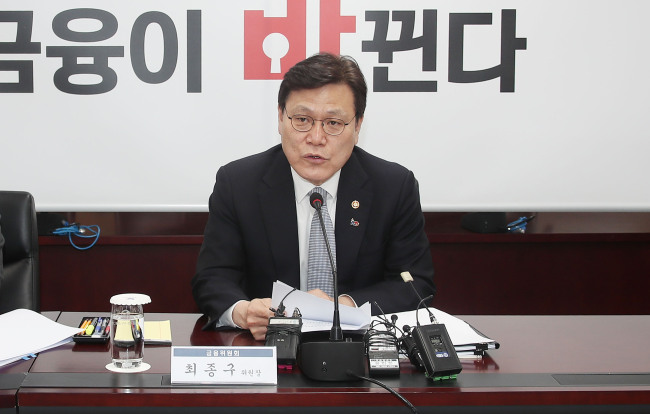Venture capitalists in the global startup scene have to pay a hefty price -- hundreds of millions of dollars -- to take part in a later-stage round of investment.
In South Korea, one of the nations riding the up cycle in the startup ecosystem, domestic venture investment in startups has mainly been concentrated in small- and midsized investment rounds with a risk-averse stance. Startups lose out on early-stage seed funding and larger-scale investment rounds.
Now, the Korean government appears to be laying the groundwork for autonomy in later-stage series funding for startups at the pre-unicorn stage. This is aimed at fighting the influx of later-stage foreign investment, says the government, calling it a “customary” practice that Korean startups rely on and saying it stands in the way of the birth of a homegrown unicorn.
 |
Financial Services Commission Chairman Choi Jong-ku (Yonhap) |
To address the lack of funding in larger-scale round investment than the size of series A, the Financial Services Commission vowed in March an additional 7 trillion won ($6.1 billion) investment in startups over the course of two years by 2022. This adds to ongoing plans for 8 trillion won investment from a fund of funds called an “growth support fund” from 2018 to 2020.
To facilitate funding for potential unicorns, investors will be encouraged to provide at least 500 billion won within each investment fund that branches out of the FOF. The upper cap limiting investment in a single company will be lifted by 75-80 percent to 500 billion won.
The Ministry of SMEs and Startups and the state-led Korea Technology Finance Corporation on April 23 also announced plans to support potential unicorns in need of credit guarantees, with a budget of some 100 billion won.
On the other hand, state-led lender the Korea Development Bank in April formed a co-investing roundtable called the Mega-7 Club with the nation’s top-tier VCs -- Korea Investment Partners, Smilegate Investment, Intervest, KTB Network, IMM Investment and LB Investment. KDB said the roundtable would strengthen ties among partners for a “sizable landmark venture investment deal.”
This comes amid Korean investors giving the cold shoulder to funding rounds larger than series B for startups amid concerns about overvaluation in Korean startups as a whole.
Of the total 294 round investments into startups last year, more than 3 out of 4 amounted to no more than 10 billion won, according to Korean startup ecosystem tracker Venture Square.
Among 96 rounds where both the amount and stage of funding were open to the public, nearly half fell into the category of series A, while less than 10 percent could be considered series C investment or above. The data did not separate domestic venture investors from the total.
Instead, Korean startups have been turning to overseas investors to win unicorn status, while receiving foreign capital is widely considered a litmus test for neutral valuation of startups.
Kurly, operator of online grocery market platform “Market Kurly,” announced in April that it fetched 100 billion won in series D round from investors led by Sequoia Capital China. Woowa Brothers, a Seoul-based operator of the No. 1 food delivery platform, Baedal Minjok, became a unicorn in December last year, bagging $320 million round investment from Chinese private equity firm Hillhouse Capital, US-based Sequoia Capital and Singapore’s sovereign wealth fund GIC.
Mobile money transfer app “Toss” operator Viva Republica snagged $80 million investment round in December joined by Silicon Valley-based VCs Kleiner Perkins and Ribbit Capital to win unicorn status. Korean e-commerce firm Coupang in November last year raised $2 billion from Tokyo-based SoftBank’s Vision Fund, three years after it attained unicorn status from SoftBank-led round investment.
“With a state-led round of funding for a startup, a return is not necessarily expected because the government emphasizes enlarging its portfolio through short-term investments, leading startups in Korea to look to large-scale funding led by foreigners as a way to obtain accurate valuations,” an industry source said on condition of anonymity.
In addition, there are growing calls on deregulation for venture investors to a larger extent to ultimately stimulate domestic large-scale round fundings.
Experts note that Korea’s unique regulation hampers the diversity and growth of Korean startup ecosystem.
For instance, under Korea’s Enforcement Decree of the Support for Small and Medium Enterprise Establishment by Ministry of SMEs and Startups, the scope of an investment firm is limited due to a set of criteria for human resources with requirements of financial career background, industry sources say.
“Korean regulations place more emphasis on finance experience over entrepreneurial or operational experience with regards to venture capital funds,” said Eugene Kim, general partner and chief executive of startup accelerator SparkLabs.
By Son Ji-hyoung (
consnow@heraldcorp.com)








